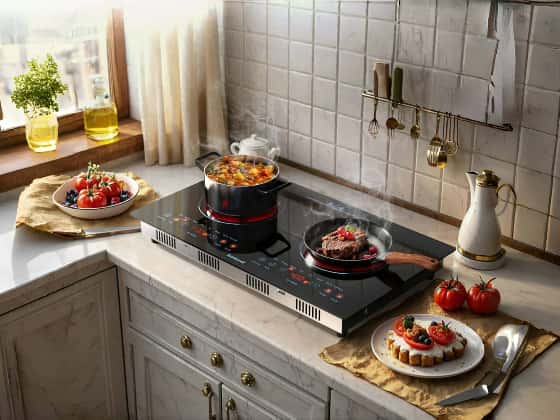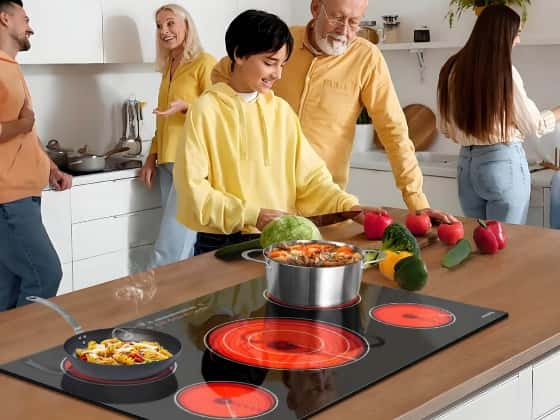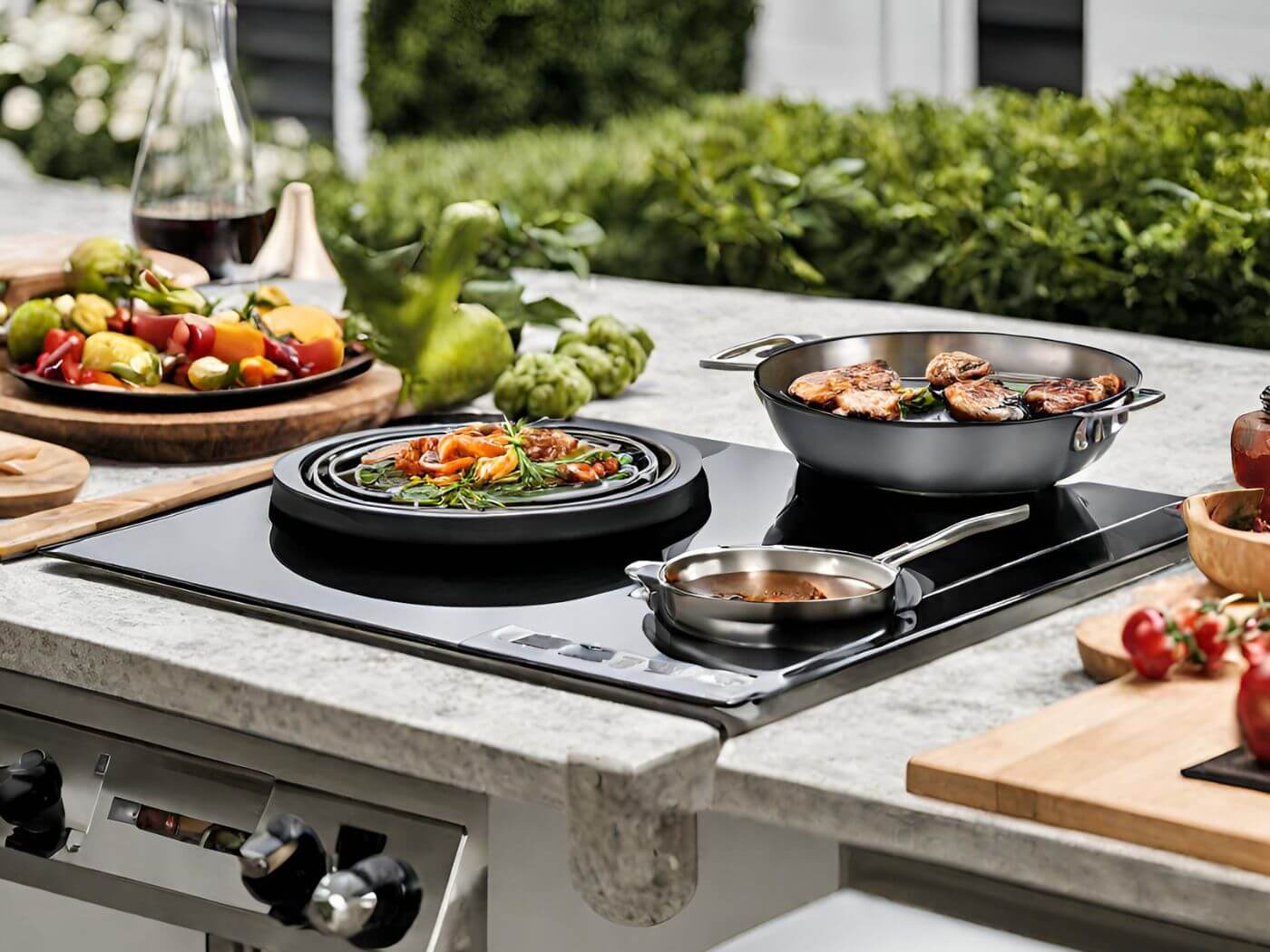
Introduction to Kitchen Appliances
When it comes to the heart of any home, the kitchen is often considered the most important space. And at the center of every great kitchen lies a reliable and efficient kitchen appliance. Whether you're a seasoned chef or an occasional home cook, choosing the perfect kitchen stove can make a world of difference in your culinary adventures. In this ultimate guide, we will explore the different types of kitchen stoves available in the market today: induction, electric, and gas. By understanding the pros and cons of each option, as well as the factors to consider when making your choice, you'll be well-equipped to find the ideal stove for your needs.
Different Types of Kitchen Stoves: Induction, Electric, and Gas
Before diving into the details, let's first understand the basic differences between induction, electric, and gas stoves.
Induction Cooktops: Induction cooktops utilize magnetic fields to directly heat the cooking vessel, rather than the surrounding air or the cooktop surface. This results in faster heating times and precise temperature control.
Electric Stoves: Electric stoves, on the other hand, use heating elements located beneath a smooth glass or ceramic surface. They are known for their even heat distribution and ease of cleaning.
Gas Stoves: Gas stoves rely on open flames produced by natural gas or propane. They offer instant heat and visual control over the flame size, making them a favorite among professional chefs.
Now that we have a basic understanding of the different stove types, let's delve into the pros and cons of each option.

Pros and Cons of Induction Cooktops
Induction cooktops have gained popularity in recent years due to their sleek design and advanced cooking technology. Here are some advantages and disadvantages to consider:
Pros:
-
Speed and Efficiency: Induction cooktops heat up quickly and provide immediate response when adjusting the temperature. This can save you valuable time in the kitchen.
-
Safety: Induction cooktops remain cool to the touch, making them a safer option for households with children or elderly individuals. Additionally, because the heat is transferred directly to the cookware, there is minimal risk of accidental burns.
-
Energy Efficiency: Induction cooktops are highly energy-efficient, as they only heat the cookware and not the surrounding air. This can result in significant energy savings over time.
Cons:
-
Compatibility: Induction cooktops require the use of cookware made from magnetic materials, such as cast iron or stainless steel. Cookware made from aluminum, copper, or glass will not work on induction stoves.
-
Initial Cost: Induction cooktops tend to be more expensive upfront compared to electric or gas stoves. However, the long-term energy savings may offset the initial investment.
-
Noise: Some induction cooktops produce a buzzing sound during operation. While this may not be an issue for everyone, it is worth considering if you prefer a quieter cooking experience.
While induction cooktops offer numerous benefits, they may not be the perfect choice for every kitchen. Let's explore the pros and cons of electric stoves next.
Pros and Cons of Electric Stoves
Electric stoves have been a staple in kitchens for decades, offering reliable performance and ease of use. Here are the advantages and disadvantages of electric stoves to help you make an informed decision:
Pros:
-
Even Heat Distribution: Electric stoves provide consistent heat distribution across the entire cooking surface, ensuring your food cooks evenly.
-
Easy to Clean: The smooth glass or ceramic surface of electric stoves makes cleaning a breeze. Spills and splatters can be easily wiped away without the need for special cleaning products.
-
Versatility: Electric stoves can accommodate a wide range of cookware, including non-magnetic materials like aluminum or glass.
Cons:
-
Slower Heating: Electric stoves generally take longer to heat up compared to induction or gas stoves. This may be a disadvantage if you're looking for fast cooking times.
-
Limited Temperature Control: Electric stoves may not offer the same level of temperature control as induction or gas stoves. This can be a drawback for recipes that require precise heat adjustments.
-
Higher Energy Consumption: Electric stoves tend to use more energy compared to induction or gas stoves. This can result in higher utility bills, especially if you cook frequently.
Now that we've explored the pros and cons of electric stoves, let's move on to gas stoves and discover their unique features.
Pros and Cons of Gas Stoves
Gas stoves have long been favored by professional chefs for their precise control and instant heat. Here are the advantages and disadvantages of gas stoves to consider:
Pros:
-
Immediate Heat: Gas stoves offer instant heat, allowing you to start cooking right away. The flame can be easily adjusted to achieve the desired level of heat for different cooking techniques.
-
Visual Control: Gas stoves provide a visual flame, allowing you to gauge the intensity of the heat at a glance. This can be particularly useful for tasks that require specific flame sizes, such as searing or simmering.
-
Reliability: Gas stoves continue to function even during power outages, making them a reliable cooking option in case of emergencies.
Cons:
-
Safety Concerns: Gas stoves involve an open flame, which can pose a fire hazard if not used with caution. Proper ventilation is also essential to prevent the buildup of harmful gases, such as carbon monoxide.
-
Maintenance: Gas stoves require regular cleaning and maintenance to ensure optimal performance and safety. Burner grates, drip pans, and gas lines should be inspected and cleaned regularly.
-
Limited Energy Efficiency: Gas stoves are generally less energy-efficient compared to induction or electric stoves. The heat generated by the flame can escape into the surrounding environment, resulting in wasted energy.
Now that we've thoroughly explored the pros and cons of each type of kitchen stove, let's move on to the factors you should consider when making your final decision.

Factors to Consider when Choosing a Kitchen Stove
Selecting the perfect kitchen stove involves more than just weighing the pros and cons of each type. Here are some additional factors to consider before making your decision:
-
Cooking Style and Preferences: Think about the type of cooking you enjoy and the features that would enhance your experience. Are you an avid baker who requires precise temperature control? Do you frequently cook with large and heavy pots that may benefit from the immediate heat of gas stoves? Consider your unique needs and preferences when making your choice.
-
Kitchen Layout and Design: The layout and design of your kitchen may influence your stove selection. If you have limited space or prefer a minimalist aesthetic, an induction or electric stove with a smooth glass or ceramic surface may be the best fit. On the other hand, if you have ample space and prefer a more traditional look, a gas stove with a prominent range hood could be the perfect addition to your kitchen.
-
Budget and Long-Term Savings: Take into account your budget for purchasing a kitchen stove. While induction cooktops may have a higher upfront cost, they can offer long-term energy savings. Gas stoves, on the other hand, may have lower upfront costs but can result in higher utility bills. Consider the long-term financial implications when making your decision.
By carefully considering these factors, you'll be able to choose a kitchen stove that perfectly suits your needs and enhances your cooking experience.
Comparing Energy Efficiency of Induction, Electric, and Gas Stoves
Energy efficiency is an important consideration when selecting a kitchen stove, both for environmental reasons and cost savings. Let's compare the energy efficiency of induction, electric, and gas stoves:
Induction Stoves: Induction stoves are highly energy-efficient, as they only heat the cookware and not the surrounding air. This focused heating method results in minimal heat loss and energy waste.
Electric Stoves: Electric stoves are generally less energy-efficient compared to induction stoves. The heat generated by the electric elements can escape into the surrounding environment, resulting in wasted energy.
Gas Stoves: Gas stoves fall in the middle in terms of energy efficiency. While they are not as energy-efficient as induction stoves, they do have an advantage over electric stoves in terms of immediate heat and precise control.
When considering energy efficiency, it's important to also factor in the type of cookware you will be using. Induction cooktops require cookware made from magnetic materials, while electric and gas stoves can accommodate a wider range of materials.
There are other considerations. See you in the next blog. To be continued.






